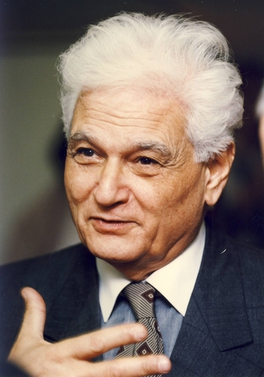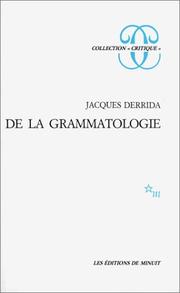Related Research Articles
Deconstruction is any of a loosely-defined set of approaches to understanding the relationship between text and meaning. The concept of deconstruction was introduced by the philosopher Jacques Derrida, who described it as a turn away from Platonism's ideas of "true" forms and essences which are valued above appearances. Since the 1980s, these proposals of language's fluidity instead of being ideally static and discernible have inspired a range of studies in the humanities, including the disciplines of law, anthropology, historiography, linguistics, sociolinguistics, psychoanalysis, LGBT studies, and feminism. Deconstruction also inspired deconstructivism in architecture and remains important within art, music, and literary criticism.

Ferdinand de Saussure was a Swiss linguist, semiotician and philosopher. His ideas laid a foundation for many significant developments in both linguistics and semiotics in the 20th century. He is widely considered one of the founders of 20th-century linguistics and one of two major founders of semiotics, or semiology, as Saussure called it.
Post-structuralism is a philosophical movement that questions the objectivity or stability of the various interpretive structures that are posited by structuralism and considers them to be constituted by broader systems of power. Although post-structuralists all present different critiques of structuralism, common themes among them include the rejection of the self-sufficiency of structuralism, as well as an interrogation of the binary oppositions that constitute its structures. Accordingly, post-structuralism discards the idea of interpreting media within pre-established, socially constructed structures.

Structuralism is an intellectual current and methodological approach, primarily in the social sciences, that interprets elements of human culture by way of their relationship to a broader system. It works to uncover the structural patterns that underlie all the things that humans do, think, perceive, and feel.

Jacques Derrida was an Algerian-born French philosopher. He developed the philosophy of deconstruction, which he utilized in numerous texts, and which was developed through close readings of the linguistics of Ferdinand de Saussure and Husserlian and Heideggerian phenomenology. He is one of the major figures associated with post-structuralism and postmodern philosophy although he distanced himself from post-structuralism and disowned the word "postmodernity".
Différance is a French term coined by Jacques Derrida. It is central to Derrida's concept of deconstruction, a critical outlook concerned with the relationship between text and meaning. The term différance means both "difference of meaning" and "deferral of meaning".
In critical theory and deconstruction, phallogocentrism is a neologism coined by Jacques Derrida to refer to the privileging of the masculine (phallus) in the construction of meaning. The term is a blend word of the older terms phallocentrism and logocentrism.
A binary opposition is a pair of related terms or concepts that are opposite in meaning. Binary opposition is the system of language and/or thought by which two theoretical opposites are strictly defined and set off against one another. It is the contrast between two mutually exclusive terms, such as on and off, up and down, left and right. Binary opposition is an important concept of structuralism, which sees such distinctions as fundamental to all language and thought. In structuralism, a binary opposition is seen as a fundamental organizer of human philosophy, culture, and language.
Jonathan Culler is an American literary critic. He was Class of 1916 Professor of English and Comparative Literature at Cornell University. His published works are in the fields of structuralism, literary theory and literary criticism.

In social theory and philosophy, antihumanism or anti-humanism is a theory that is critical of traditional humanism, traditional ideas about humanity and the human condition. Central to antihumanism is the view that philosophical anthropology and its concepts of "human nature", "man" or "humanity" should be rejected as historically relative, ideological or metaphysical.
"Structure, Sign, and Play in the Discourse of the Human Sciences" was a lecture presented at Johns Hopkins University on 21 October 1966 by philosopher Jacques Derrida. The lecture was then published in 1967 as chapter ten of Writing and Difference.
Difference is a key concept of philosophy, denoting the process or set of properties by which one entity is distinguished from another within a relational field or a given conceptual system. In the Western philosophical system, difference is traditionally viewed as being opposed to identity, following the Principles of Leibniz, and in particular, his Law of the identity of indiscernibles. In structuralist and poststructuralist accounts, however, difference is understood to be constitutive of both meaning and identity. In other words, because identity is viewed in non-essentialist terms as a construct, and because constructs only produce meaning through the interplay of differences, it is the case that for both structuralism and poststructuralism, identity cannot be said to exist without difference.
Phonocentrism is the belief that sounds and speech are inherently superior to, or more primary than, written language or sign language. Those who espouse phonocentric views maintain that spoken language is the primary and most fundamental method of communication whereas writing is merely a derived method of capturing speech. Many also believe that spoken language is inherently richer and more intuitive than written language.
In modern usage, the term grammatology refers to the scientific study of writing systems or scripts. This usage was first elucidated in English by linguist Ignace Gelb in his 1952 book A Study of Writing. The equivalent word is recorded in German and French use long before then. Grammatology can examine the typology of scripts, the analysis of the structural properties of scripts, and the relationship between written and spoken language. In its broadest sense, some scholars also include the study of literacy in grammatology and, indeed, the impact of writing on philosophy, religion, science, administration and other aspects of the organization of society. Historian Bruce Trigger associates grammatology with cultural evolution.
In literary theory, textuality comprises all of the attributes that distinguish the communicative content under analysis as an object of study. It is associated with structuralism and post-structuralism.

Of Grammatology is a 1967 book by the French philosopher Jacques Derrida. The book, originating the idea of deconstruction, proposes that throughout continental philosophy, especially as philosophers engaged with linguistic and semiotic ideas, writing has been erroneously considered as derivative from speech, making it a "fall" from the real "full presence" of speech and the independent act of writing.
Sous rature is a strategic philosophical device originally developed by Martin Heidegger. Though never used in its contemporary French terminology by Heidegger, it is usually translated as 'under erasure', and involves the crossing out of a word within a text, but allowing it to remain legible and in place. Used extensively by Jacques Derrida, it signifies that a word is "inadequate yet necessary"; that a particular signifier is not wholly suitable for the concept it represents, but must be used as the constraints of our language offer nothing better.
Trace is one of the most important concepts in Derridian deconstruction. In the 1960s, Jacques Derrida used this concept in two of his early books, namely Writing and Difference and Of Grammatology.
Structural linguistics, or structuralism, in linguistics, denotes schools or theories in which language is conceived as a self-contained, self-regulating semiotic system whose elements are defined by their relationship to other elements within the system. It is derived from the work of Swiss linguist Ferdinand de Saussure and is part of the overall approach of structuralism. Saussure's Course in General Linguistics, published posthumously in 1916, stressed examining language as a dynamic system of interconnected units. Saussure is also known for introducing several basic dimensions of semiotic analysis that are still important today. Two of these are his key methods of syntagmatic and paradigmatic analysis, which define units syntactically and lexically, respectively, according to their contrast with the other units in the system.
Fuoco B. Fann, is a cultural theorist. He is noted for synthesizing Post-structuralism with American Literary Criticism, Intercultural Philosophy, and Material Culture Studies. He taught at Lanzhou Jiaotong University, China before moving in 1989 to the United States, where he guest-lectured at California State University, East Bay and UC Davis, and has since resided in California. Fann’s monograph on post-structuralism and intercultural philosophy, This Self We Deserve: A Quest after Modernity, was published in 2020.
References
- Barry, P (2009), Beginning theory: an introduction to literary and cultural theory, 3rd edn, Manchester University Press, New York.
- Derrida, J (1976), 'Linguistics and Grammatology', Of Grammatology, Johns Hopkins University Press, Baltimore, pp. 27–73, (CRO— CQU Library, HUMT20012 Code).
- Geaney, J (2010), 'Grounding “Language” in the senses : what the eyes and ears reveal about MING (names) in early Chinese texts', Philosophy East & West, vol. 60, no. 2, pp. 251–293.
- Josephson-Storm, Jason, The Myth of Disenchantment: Magic, Modernity, and the Birth of the Human Sciences, University of Chicago Press, 2017.
- Tedlock, D 1979, ‘Beyond logocentrism: trace and voice among the Quiché Maya’, Boundary 2, vol. 8, no. 1, pp. 321–333.